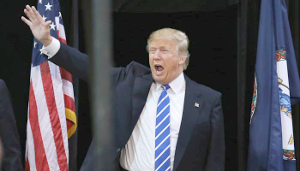As was expected from reports yesterday, President Trump today unveiled some new details on his budget priorities, seeking a 9% increase, or about $54 billion, in increased military spending for next year, with a series of plans to reduce domestic spending to try to cover the different.
 Exactly where all the cuts are coming from is unclear, but the State Department and the EPA are both said to also be marked for substantial cuts in the range of tens of billions of dollars, and President Trump is determined to keep his campaign promise not to touch Social Security, other domestic programs are all facing potential cuts.
Exactly where all the cuts are coming from is unclear, but the State Department and the EPA are both said to also be marked for substantial cuts in the range of tens of billions of dollars, and President Trump is determined to keep his campaign promise not to touch Social Security, other domestic programs are all facing potential cuts.
Since the election, President Trump has been talking up some very expensive military plans, including increases in the number of troops, ships, and warplanes the US has available, and has talked up more nuclear weapons recently, arguing the US needs to be unrivaled.
Trump is further arguing that the US needs an increased budget in general to “win wars again,” lamenting that when he was younger people used to say the US “never lost a war.” A 9% increase is a big one, given how big the US military’s budget already is, and that the growth is in the range of the whole annual military budget of a country like France or Britain.
But the one certainty in any budget proposed by any president with any level of military spending increase is that the hawks in Congress won’t think it’s enough, and that’s true today as well, with Sen. John McCain (R – AZ) and others attacking the plan as nowhere near enough of an increase to military spending.
McCain went so far as to predict that a budget with “only” a 9 percent increase might not have enough support to get through the Senate at all. This may be a huge concern, with a number of top Democrats already voicing concerns about the cuts elsewhere expected to pay for the increase.


